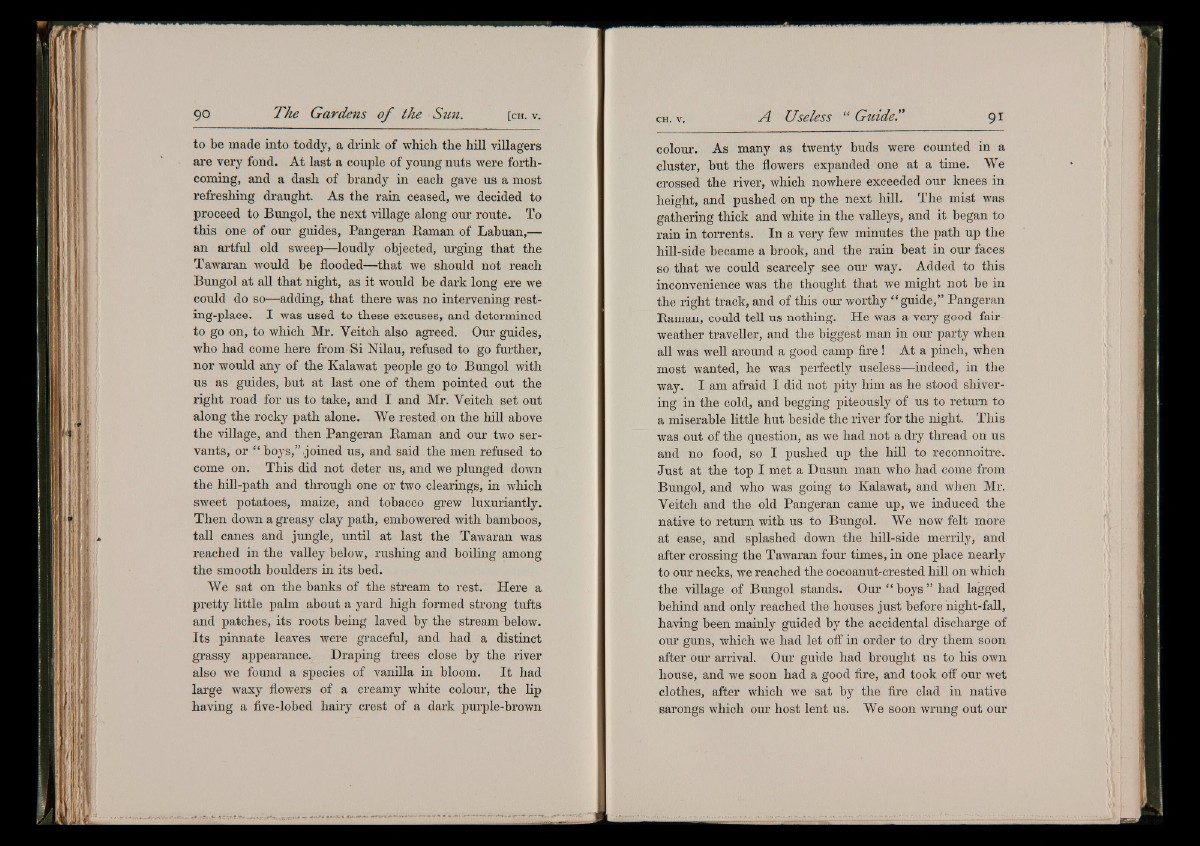
to be made into toddy, a drink of which the hill villagers
are very fond. At last a couple of young nuts were forthcoming,
and a dash of brandy in each gave us a most
refreshing draught. As the rain ceased, we decided to
proceed to Bungol, the next village along our route. To
this one of our guides, Pangeran Baman of Labuan,—
an artful old sweep—loudly objected, urging that the
Tawaran would be flooded—that we should not reach
Bungol at all that night, as it would be dark long ere we
could do so—adding, that there was no intervening resting
place. I was used to these excuses, and determined
to go on, to which Mr. Yeitch also agreed. Our guides,
who had come here from Si Nilau, refused to go further,
nor would any of the Kalawat people go to Bungol with
us as guides, but at last one of them pointed out the
right road for us to take, and I and Mr. Yeitch set out
along the rocky path alone. We rested on the hill above
the village, and then Pangeran Baman and our two servants,
or “ boys,” joined us, and said the men refused to
come on. This did not deter us, and we plunged down
the hill-path and through one or two clearings, in which
sweet potatoes, maize, and tobacco grew luxuriantly.
Then down a greasy clay path, embowered with bamboos,
tall canes and jungle, until at last the Tawaran was
reached in the valley below, rushing and boiling among
the smooth boulders in its bed.
We sat on the banks of the stream to rest. Here a
pretty little palm about a yard high formed strong tufts
and patches, its roots being laved by the stream below.
Its pinnate leaves were graceful, and had a distinct
grassy appearance. Draping trees close by the river
also we found a species of vanilla in bloom. It had
large waxy flowers of a creamy white colour, the lip
having a five-lobed hairy crest of a dark purple-brown
colour. As many as twenty buds were counted in a
cluster, but the flowers expanded one at a time. We
crossed the river, which nowhere exceeded our knees in
height, and pushed on up the next hill. The mist was
gathering thick and white in the valleys, and it began to
rain in torrents. In a very few minutes the path up the
hill-side became a brook, and the rain beat in our faces
so that we could scarcely see our way. Added to this
inconvenience was the thought that we might not be in
the right track, and of this our worthy “ guide,” Pangeran
Eaman, could tell us nothing. He was a very good fair-
weather traveller, and the biggest man in our party when
all was well around a good camp fire ! At a pinch, when
most wanted, he was perfectly useless—indeed, in the
way. I am afraid I did not pity him as he stood shivering
in the cold, and begging piteously of us to return to
a miserable little hut beside the river for the night. This
was out of the question, as we had not a dry thread on us
and no food, so I pushed up the hill to reconnoitre.
Just at the top I met a Dusun man who had come from
Bungol, and who was going to Kalawat, and when Mr.
Veitch and the old Pangeran came up, we induced the
native to return with us to Bungol. We now felt more
at ease, and splashed down the hill-side merrily, and
after crossing the Tawaran four times, in one place nearly
to our necks, we reached the cocoanut-crested hill on which
the village of Bungol stands. Our “ boys ” had lagged
behind and only reached the houses just before night-fall,
having been mainly guided by the accidental discharge of
our guns, which we had let off in order to dry them soon
after our arrival. Our guide had brought us to his own
house, and we soon had a good fire, and took off our wet
clothes, after which we sat by the fire clad in native
sarongs which our host lent us. We soon wrung out our